
views
Preparing to Dance the Hustle

Locate some disco music to dance too. You do not need the exact "Hustle" dance song, but something similar would be appropriate. Hustle music is in 4/4 time, which means there are 4 beats per measure. You will want a disco song that has 4 beats per measure. "Shake Your Groove Thing" and "Disco Inferno" are classic examples of disco songs in 4/4 time. To determine the time of a song, listen to the song for a while. As you feel the rhythm, clap your hands every time you hear a major beat in the song lyrics. This will get you your "top" number, which is usually always 4 or 8. For the "bottom" number, listen closely to the baseline. Clap your hands every time you hear a major beat in the baseline. The "bottom" number is also, almost every time, 4 or 8. You can find more information about the time of songs here How to Calculate the Time Signature of a Song.
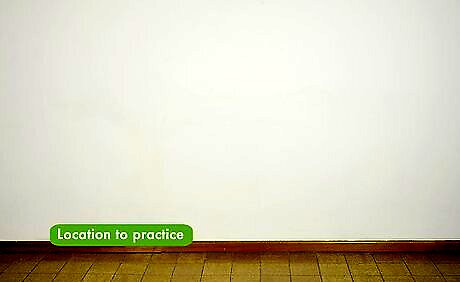
Pick out a location to practice. This could be your living room, bedroom, or a larger dance studio. Before you begin practicing, clear away any clutter in the room so that you don't trip and fall. It is best to first practice on a carpeted floor, especially if you have a tendency to trip over your feet. If you are not in a dance studio, try to find a long mirror (usually hang on the back of bedroom/bathroom doors). Seeing yourself dance in front of the mirror will improve your presentation when you go to dance in front of other people. You will be able to see whether you are moving your upper torso enough, how wide your steps are, etc. If you are dancing on hardwood floors, try and wear tennis shoes, especially for first time dancers. Wearing socks, ballet shoes, or Toms can cause you to slip on waxed hardwood floors.
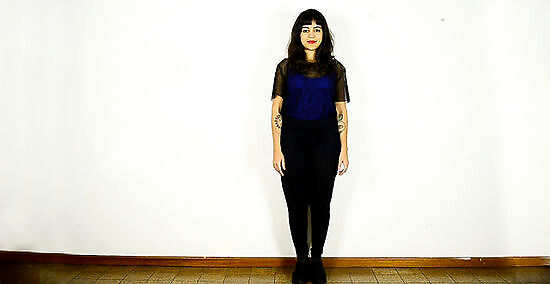
Learn to count the beats. The count for the hustle dance is "1, 2, 3, And. 1, 2, 3, And. Etc." The "And" is the transition between one major part of the dance and the next. Practice stepping to the beat. Turn the music off and just count aloud to yourself. Step right, left, front and back while staying in rhythm. Maintain the beat in your head and allow your footsteps to follow the beat. Practice moving your upper torso as well. While your feet are the most crucial part of the dance, your upper body shouldn't be stiff. Your body should move in and out, up and down with the beat as well.

Dress appropriately for the dance routine. When you are practicing you will want to wear loose fit clothing. This is because there are arm, leg, and hip movements. You need room to move freely and loose. Sweatpants, and a loose t-shirt are great to practice in. When you go out to parties and show off your dance routine, you will want to wear something different. Once more, you will want something loose. Don't wear skinny jeans, or tight fitting blouses when dancing the hustle. You will want a shirt with a little extra room, and pants which give an extra inch or two. You can also wear 1970's style clothes to go with the dance. Bellbottoms, disco shirts, and hippie jackets are all great. Go all out, and really recreate the 70's scene.
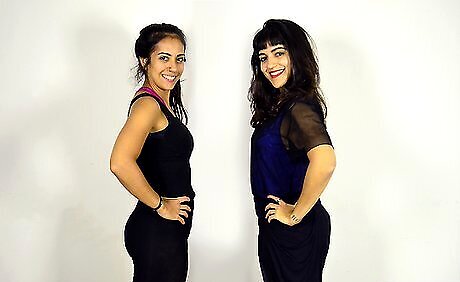
Find an experienced partner to practice with. While this isn't an absolute necessity, you will be able to critique one another on how to make each other's dance better. The hustle is traditionally a line dance, meaning that you dance in a line with other people, turning 90 degrees between full dance routines. Having a partner nearby, dancing with you, will get you accustomed to having other people nearby as you dance. The person you choose does not have to be a professional. Having two novices learn the dance at the same time together can greatly improve one another's skills. Having a partner with you as go out to clubs/parties and dance will also increase your self-esteem as you dance. The goal of any dance is to have fun, so having a partner with whom you have practiced with can increase your motive to go all out. "Cha-Cha Slide" is an example of a famous line dance done at parties.
Dancing the Hustle
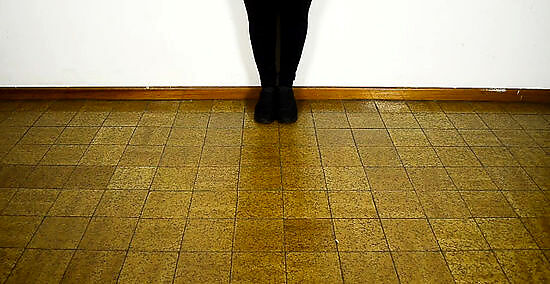
Walk forward at a steady beat. Begin by standing upright, with your hands to your sides, and your feet closed together. Walk forward in the following pattern: right, left, right. The fourth step is to bring both feet together and tap them. If you are following the correct beat, "1, 2, 3, And" is "right, left, right, tap." Each of your steps should be fairly small steps, about 6 inches (15 cm) in front of the other. You do not want your steps to be too long, otherwise you could bump into someone else in front of you. As you are making the steps, keep your hands to the side, but move them in circular motions. Try to keep your hands moving in the same way your feet are. Every time you move your right foot, move your right hand forward, left foot, left hand, etc. Your hands should move similarly to pedals on a bicycle.
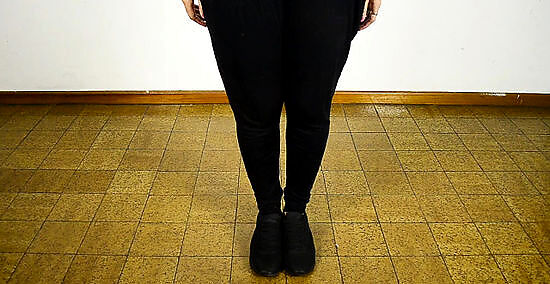
Take steps backwards as you follow the beat. After you have tapped your feet together, move your feet backwards in small steps. The pattern should go: left, right, left. The fourth step is to tap your feet together. If you are following the correct beat, "1, 2, 3, And" is "left, right, left, tap." After you get done this sequence of moves, you should be back in the original position you were in at the beginning of Step 1. Each of these backwards steps should be fairly small, about the same size as the forward steps (6 inches in front of one another). Do not make them too large otherwise you could bump into another dancer behind you. As you are taking the steps backwards, move your hands backwards as well. Every time you move your left foot backwards a step, move your left hand backwards in a circular motion, right foot, right hand, etc. Your hands should look similar to bicycle pedals moving backwards.
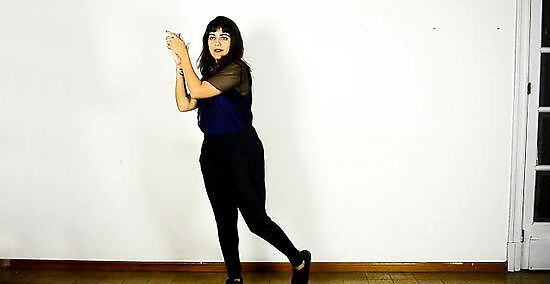
Twirl to the right. After you have finished moving forwards and backwards, you are ready to twirl. This move is commonly referred to as a "step-turn-step-clap." You first step your right foot slightly to the right, about 6 inches (15 cm). This foot will be your plant foot for the turn. Lift up your left foot, and turn clockwise about 270 degrees. As you are turning, lean your body weight on your right foot. After you have turned, you will take another step forward with your right foot. Finish off this sequence by bringing your hands together and clapping them once. The "step-turn-step-clap" should follow the "1, 2, 3, And," beat. Keep your arms out at 45 degree angles as you are twirling.
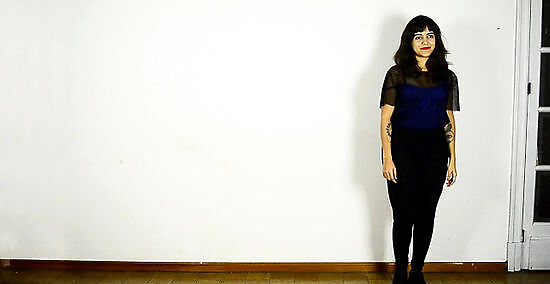
Twirl to the left. After you have clapped, you can then move on to turning back the other direction. Take an initial step with your left foot, slightly to the left, about 6 inches (15 cm) away. This left foot will be your new plant foot. Lift up your right foot and twist your body counter-clockwise 270 degrees. As you are turning, lean your weight on your left plant foot. After you have turned, take another step forward with your left foot about 6 inches (15 cm) away. Finish off this sequence of dance moves by bringing your hands together in front of your chest and clapping once. Keep your arms out at 45 degree angles as you are turning. Just like before, this "step-turn-step-clap" will follow a "1, 2, 3, And," beat. When you get done this sequence of moves, you should again be right back where you started.
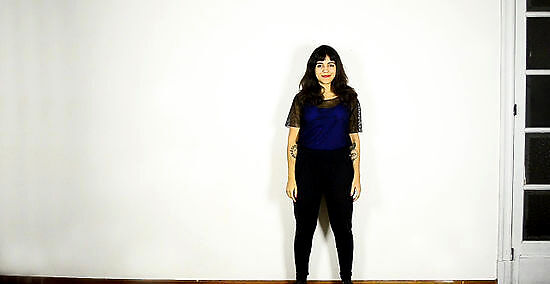
Point up and down. This move was made famous by John Travolta in the movie "Saturday Night Fever." Plant your feet about 6 inches (15 cm) apart from one another. Then make a "Number 1" sign with your right hand (right pointer finger sticking out). Take your right arm and place it in the air as high as it will go. Point rightward toward the ceiling. Then immediately take your right arm and place it down as far as it will go. Point leftward toward the ground. You will do four sets of these. This means that you will go, with your right arm, "up-down-up-down-up-down-up-down." The sequence follows the basic beat you have been using all along: "1, 2, 3, And. 1, 2, 3, And." As you are moving your right arm upwards, and towards the right, do the same with your head/eyes. Simply follow your right hand with your eyes. When your hand goes down, and to the left, follow again with your head/eyes. This is a great time to bring in some hip movement. When your hand is pointing upwards, and towards the right, twist your hips slightly to the right. When your hand goes to the left, and down, turn your hips to the left.
Finishing the Hustle
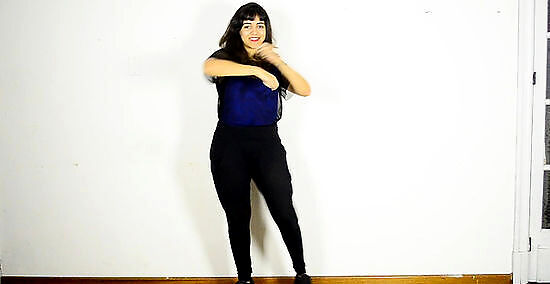
Perform a chicken dance. After you are done pointing, move directly into the chicken style dance. First, you will make fists with both hands. Then roll them over one another directly in front of your chest. You will do this for the first two beats of the "1, 2, 3, And" rhythm. Count "1, 2" in your head before you move onto the next part of the routine. Next, place your hands on your hips and bend your elbows outwards at 90 degree angles. For the third beat of the rhythm, turn your upper body towards the right, and move your "wings" (elbows) once. Then, for the fourth beat, move your upper body to the left, and move your "wings" once again. Each time you move your "wings," lift your feet up so that you are on your toes. Click your heels together. You will do this for both beat 3 and 4. The basic beat "1, 2, 3, And" should be "roll hands, roll hands, wings right, wings left."
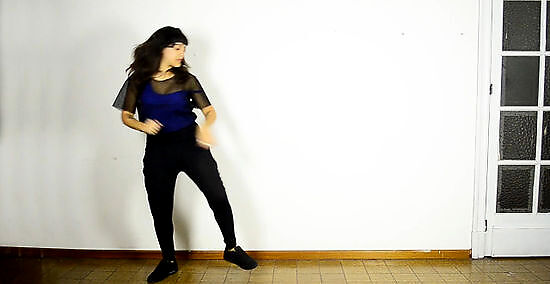
Change the position of your body. Because the hustle is a line dance, you will need to turn your body 90 degrees before you begin all of the steps all over again. Move your right foot backwards about a foot. Then move your left foot backwards a foot as well. After you get this second step backwards complete, place your entire weight o your left foot. Lift your right foot an inch off the ground. Turn your body 90 degrees clockwise (or counter-clockwise, depending on the movement of a particular dance group) while leaning your weight on your left foot. Finally, reposition your feet, and close them together. You can even click your feet together to perform a more accentuated move. The basic beat "1, 2, 3, And" will be "right, left, turn, close."
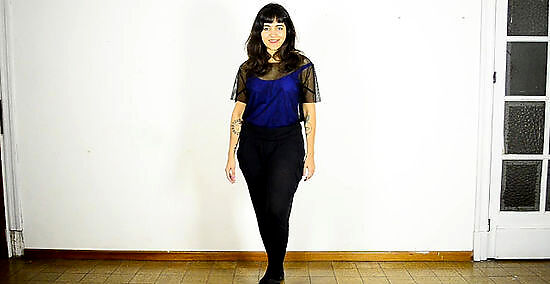
Commit the moves to memory. Try practicing the basic steps first without music. This will give you a chance to take the different steps in sections. You also won't have to worry so much about having to constantly stop and restart the music. Once you have the moves committed to memory, turn on the music and perform the steps with the beat. Do this for at least two songs. Remember each disco song is slightly different. If you get so used to dancing to one song, you won't be able to apply the moves to others. After you have practiced for a while. Wait about an hour before you begin to dance again. See if you can get up, and do all of the moves without being prompted by the beat of music. If you can do the steps right then and there, you should have them successfully committed to memory.
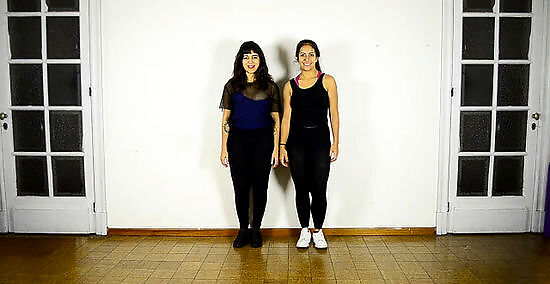
Use a partner in your dance routine. If there isn't a line at your party, you can still do the hustle by yourself, and even with a friend. Take your partner's hands in the first two steps as you are moving forwards and backwards. Note: your partner will start the hustle by moving backwards, while you are moving forwards, and vice versa. When you are turning in the next few steps, release your hands and turn at the same time. When you are both finished a turn, you will both clap in front of one another. You can also take turns twirling, watching the other partner do one twirl, and then you do the next twirl. When you do the John Travolta "point" you should do it facing one another. You can point in the same directions, or alternate for a neat effect. For example, when you point right and upwards, your partner will point left and downwards. Perform the chicken move in front of one another. Vacate the step where you turn 90 degrees clockwise. Move your right foot back, then your left. Move your right foot forward, then your right. Then begin the steps all over again.
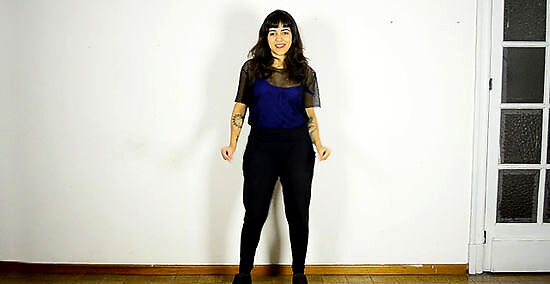
Throw in some additional moves. The hustle is a very forgiving beat, and as long as you keep the basic rhythm as outlined above, you can throw in moves from swing, salsa, merengue, west-coast swing, and cha-cha with relative ease. You can toss in different moves between major steps in the hustle, or after you have completed all of the major steps one time through. Some examples: hips thrusting forwards as you keep your hands in the air; side slides to the left and right; and/or lifting your right leg up with your right arm, lifting it four times. Whatever moves you choose, make sure that you are still following the basic beat of "1, 2, 3, And." If you are doing the hustle with a friend, stand and clap as you watch them do some extra moves. They can do the same as they watch you bust some new moves. Then join back together and go back into the routine hustle steps.



















Comments
0 comment